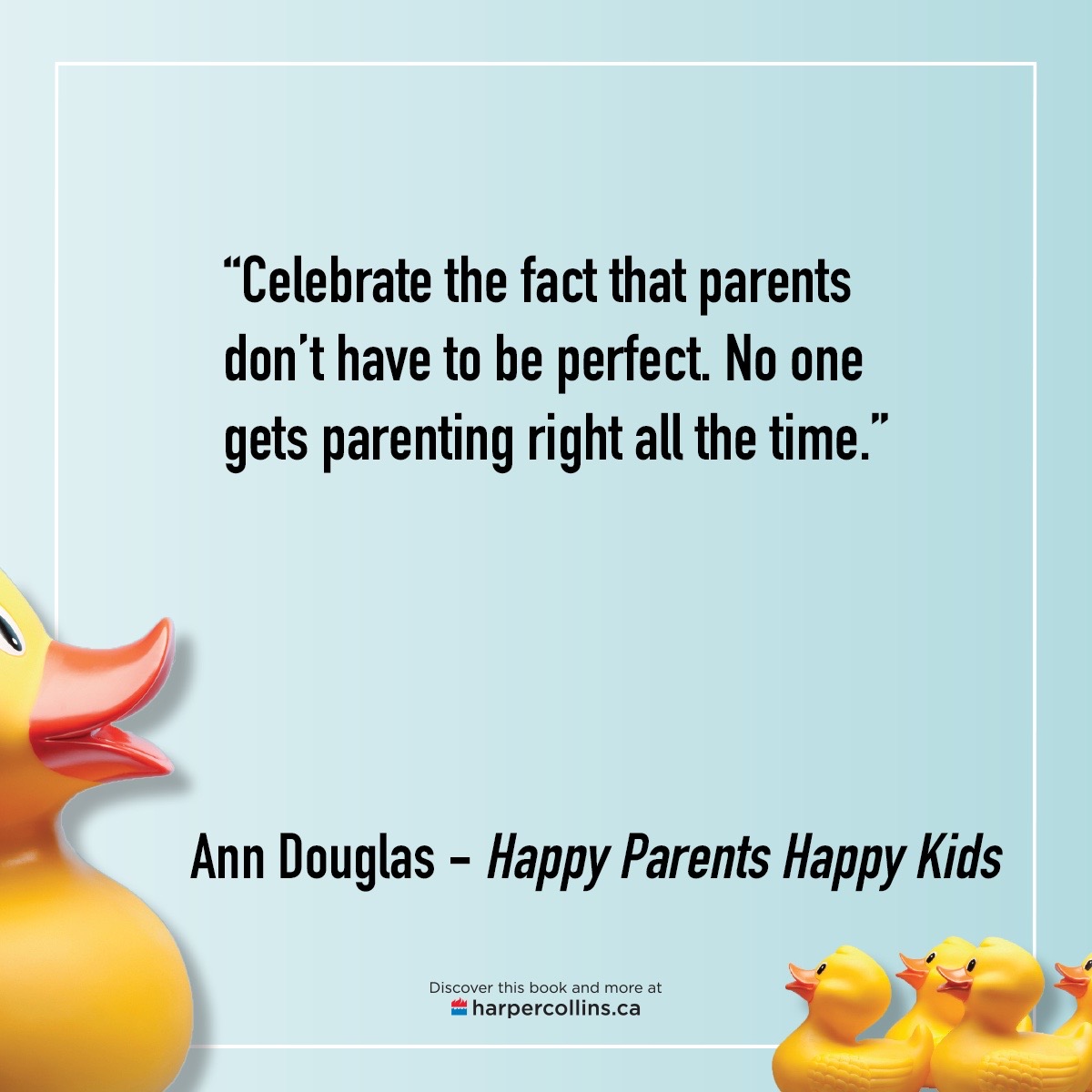Looking for the recipe for a happy (or happier) mom? Ann Douglas has a few thoughts to share on what actually contributes to happiness in mothers.
Wondering what actually contributes to happiness in mothers (as opposed to what the all the guilt-inducing messages about motherhood might have you believe)? This is a key theme in my brand new book, Happy Parents, Happy Kids, and it is the focus of my parenting column for CBC Radio this weekend. Just in case you aren’t able to tune in, here are a few highlights from some noteworthy research about what does — and doesn’t — make for a happy mom.
What moms love most about motherhood
Believe it or not, motherhood isn't just another word for misery. We moms actually derive a lot of enjoyment from motherhood and, not surprisingly, what we enjoy most about being moms is actually spending time with our kids.
As psychologist S. Katherine Nelson and her co-authors put it in a groundbreaking study entitled In Defense of Parenthood: Children Are Associated with More Joy than Misery, which was published in Psychological Science back in 2013: "Taking care of children provides parents with more happiness, on average, than their other day-to-day activities."
So far from being the source of misery, time spent with our kids is actually the good stuff in most mothers' lives.
What moms love least about being moms
Of course, that kind of begs the question: what is it about motherhood that moms love least?
The research is pretty clear on this point, too. It's all the other stuff: the stuff that gets in the way of these moments of connection with our kids. All the feelings of anxiety, guilt, and being overwhelmed that are pretty much baked into the experience of modern motherhood, in other words.
Parenting isn’t just hard. It’s almost impossibly hard. And for reasons that have little to do with parenting.
One way to manage those less-than-happy feelings is to rewrite the stories you’re telling yourself about what it means to be a good mother.
This is something I spoke with author and registered psychologist Vanessa Lapointe about recently, while I was researching my CBC Radio parenting column. Here's what she had to say: "The idea of being happy really begins with going kind of deep down within ourselves and beginning to tell ourselves a narrative or a story about our our life about ourselves as mothers, about our children, about our partners, about the world that we live in….that we concoct a story that works for us rather than a story that works against us."
So acknowledge that things are hard and then work at rewriting the script in your head — the one that tries to tell you that you're not a good enough mom.
Of course, a mindset shift isn’t going to be enough to move the happiness dial in a major way for a mom who is feeling really crushed by the demands of work-life imbalance or who is feeling frustrated by the fact that she seems to be shouldering a disproportionate amount of the parenting load.
And, as it turns out, these two factors are really key ingredients in the recipe for maternal unhappiness. So if you’d prefer to whip up a batch of maternal happiness instead, it’s pretty clear what you’ve got to do. You’ve got to switch up the recipe a little.
Reduced work-life conflict = happier moms
Research conducted by the US-based Council on Contemporary Families highlights the fact that parental happiness levels increase in the presence of policy that makes it less stressful and less costly for parents to juggle the competing demands of work and family.
When things aren't working well on that front, mothers in particular tend to experience a lot of guilt. A 2017 study published in the Journal of Child and Family Studies found, for example, that mothers experience significantly higher levels of "work-interfering-with-family guilt" than fathers do.
The good news is that access to quality affordable childcare is a complete game changer for moms, allowing parents to juggle the competing demands of work and family more easily. It helps to minimize work-life conflict, encourages greater equity in couple relationships, and eliminates the so-called motherhood tax (the fact that mothers are penalized in the workplace in terms of both income and opportunity because they still tend to be the ones in their families who take the lead when it comes to caring for children).
So better family policy that actually reflects the realities of what's happening in Canadian families in 2019 is definitely a key ingredient in the recipe for a happier mom. And it may explain why childcare is showing up on the wish lists of a lot of moms this Mother's Day. I actually spotted a hashtag on Twitter this week that declared #childcarenotchocolates. I don’t know about you, but I loved that so much….
A more realistic job description for the position of “mother” = happier moms
If you've always had a nagging suspicion that being a dad tends to be whole lot more fun than being a mom, well, it turns out that science is on your side. A 2016 study conducted at Cornell University concluded that mothers report "less happiness, more stress, and greater fatigue" during the time they spend with children than fathers do.
The job description for “father” is still a whole lot more forgiving than the job description for “mother.”
At the root of the problem is the fact that the job description for "father" continues to be a whole lot more manageable than the job description for "mother." There are more flexible and more realistic models of what it means to be "a good dad" as compared to "a good mom" — even in 2019. These stubborn gender norms conspire to make life harder for moms and dads alike which, I should add, means any person of any gender who happens to step into either of those prepackaged roles.
How does this play out in real life? Well, for starters, mothers tend to spend more of their time with their kids taking care of the hands-on, hard work of parenting, freeing dads up to enjoy more of the fun stuff.
And really, who wouldn't enjoy the fun stuff of parenting more?
There’s no one-size-fits-all motherhood experience
Of course, it’s important to acknowledge that there’s no such thing as a one-size-fits-all motherhood experience — just as there’s no such thing as one-size-fits-all anything. Some moms do have a tougher time than others. Some kids are easier to parent than others. Some stages of motherhood are easier and more enjoyable than others. (Spoiler alert: The preschool years tend to be the motherhood sweet spot.) And some parents are at increased risk of parent burnout (which is more likely to occur when parents have sky-high expectations of themselves).
It’s okay to be a gloriously imperfect mom. In fact, it’s more than okay!
So taming your own expectations of what’s realistic and possible for you in your life right now may be the most important ingredient in the recipe for a happier you. And that starts with celebrating the fact that moms don't have to be perfect. It's okay to be a gloriously imperfect mom. In fact, it's more than okay. By giving your child the gift of a gloriously imperfect mother, you're teaching your child something really important: that none of us have to be perfect in order to be worthy of love. And what a gift that message is for any child to receive.
So here’s to ditching the guilt and embracing the joy this Mother's Day.
Ann Douglas is the author of numerous bestselling books about parenting and the weekend parenting columnist for CBC Radio. Her two most recent books are Happy Parents, Happy Kids and Parenting Through the Storm. A passionate and inspiring speaker, Ann delivers keynote addresses and leads small group workshops at health, education, and parenting conferences across the country.
Related reads:



